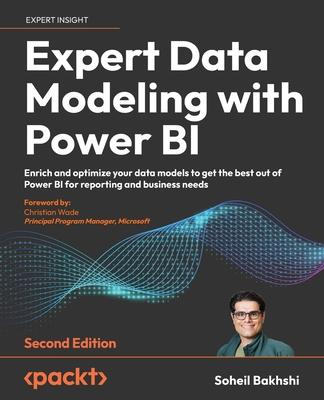Take your Power BI reports to the next level by learning various data modeling techniques and leveraging the latest features of Power BI effectively
Purchase of the print or Kindle book includes a free eBook in PDF format.
Key Features:
- Get an understanding of data modeling techniques using Power BI with this up-to-date guide
- Learn how to define the relationships between data sets to extract valuable insights
- Explore best practices for data preparation and modeling and build optimal data models to solve a wide variety of real-world business challenges
Book Description:
This book is a comprehensive guide to understanding the ins and outs of data modeling and how to create full-fledged data models using Power BI confidently.
In this new, fully updated edition, you'll learn how to connect data from multiple sources, understand data, define and manage relationships between data, and shape data models to gain deep and detailed insights about your organization. As you advance through the chapters, the book will demonstrate how to prepare efficient data models in the Power Query Editor and use simpler DAX code with new data modeling features. You'll explore how to use the various data modeling and navigation techniques and perform custom calculations using the modeling features with the help of real-world examples. Finally, you'll learn how to use some new and advanced modeling features to enhance your data models to carry out a wide variety of complex tasks. Additionally, you'll learn valuable best practices and explore common data modeling complications and the solutions to supercharge the process of creating a data model in Power BI and build better-performing data models.
By the end of this Power BI book, you'll have gained the skills you need to structure data coming from multiple sources in different ways to create optimized data models that support high-performing reports and data analytics.
What You Will Learn:
- Implement virtual tables and time intelligence functionalities in DAX to build a powerful model
- Identify Dimension and Fact tables and implement them in Power Query Editor
- Deal with advanced data preparation scenarios while building Star Schema
- Discover different hierarchies and their common pitfalls
- Understand complex data models and how to decrease the level of model complexity with different approaches
- Learn advanced data modeling techniques such as calculation groups, aggregations, incremental refresh, RLS/OLS, and more
- Get well-versed with datamarts and dataflows in PowerBI
Who this book is for:
This MS Power BI book is for BI users, data analysts, and analysis developers who want to become well-versed with data modeling techniques to make the most of Power BI. Basic working knowledge of Power BI and the Star Schema functionality are required to help you to understand the concepts covered in this book.
